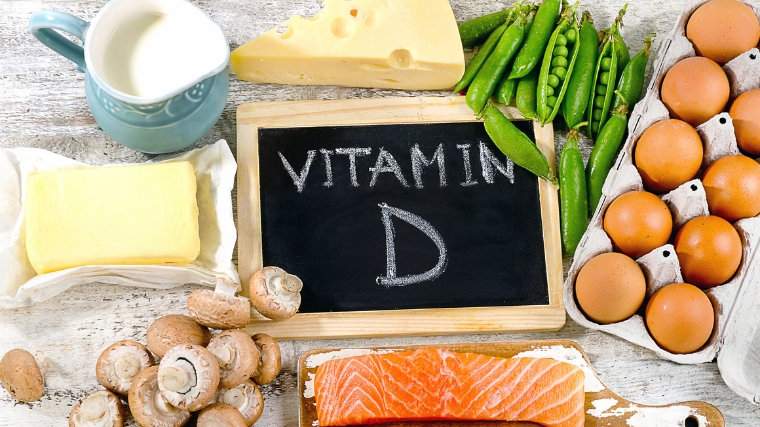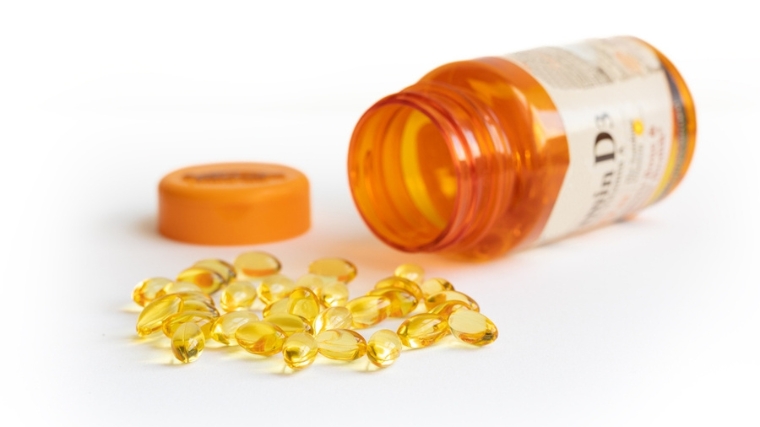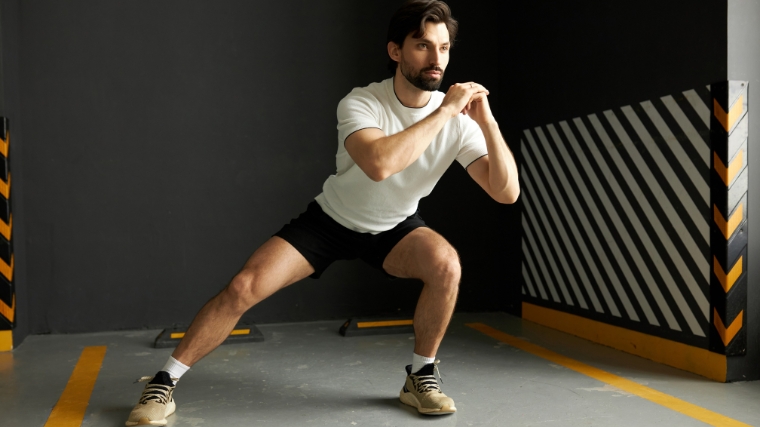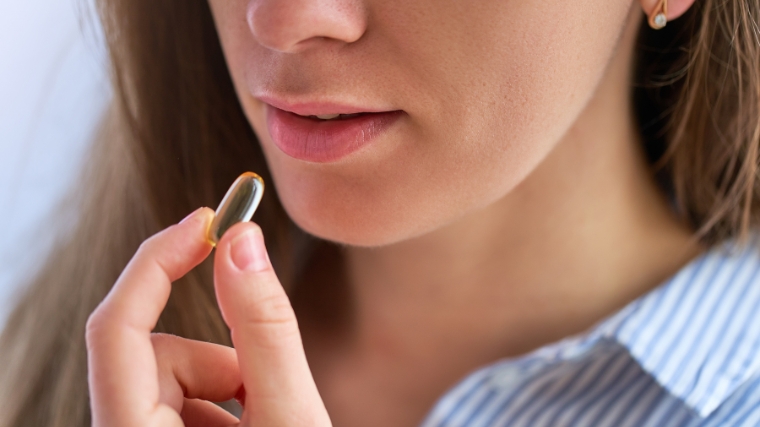[ad_1]
If the sun is shining where you are, you can get a free supplement just by heading outside. Although the sun is a direct source of vitamin D, nicknamed the sunshine vitamin, most people don’t get enough of it — even if you include Vitamin D-rich foods in your diet.
The benefits of vitamin D range from improving bone density to promoting stronger immune systems. For strength athletes, vitamin D has been shown to potentially help build muscle, improve athletic performance, reduce inflammation, and prevent and heal injuries.

Your walk to the gym to grab some extra sunlight may not provide enough vitamin D to boost your gains. Let’s dive into the science of why it may be worth adding an extra vitamin D supplement to your stack.
Editor’s Note: The content on BarBend is meant to be informative in nature, but it should not be taken as medical advice. When starting a new training regimen and/or diet, it is always a good idea to consult with a trusted medical professional. We are not a medical resource. The opinions and articles on this site are not intended for use as diagnosis, prevention, and/or treatment of health problems. They are not substitutes for consulting a qualified medical professional.
What Is Vitamin D?
Vitamin D is a fat-soluble vitamin, along with vitamin A, vitamin E, and vitamin K. Fat-soluble vitamins are stored in fat in the body, while water-soluble vitamins are stored in water. (1) The main function of Vitamin D is to balance calcium and phosphorus in the body. (1) This balance provides bone health and other musculoskeletal benefits.
Aside from calcium regulation, vitamin D has a direct effect on muscle protein synthesis, muscle function, and inflammation — processes very relevant to strength athletes. (2) These benefits were found after discovering that there is a vitamin D receptor within muscle tissue. (3)
Vitamin D is also a hormone, and it’s partially produced by sun exposure on your skin and partially taken in through your diet. (1) Vitamin D is a group of vitamins, and the levels in your body are determined by the amount of Vitamin D2 and Vitamin D3 that you take in, metabolize, and synthesize. (4)
Is Vitamin D the Same as Vitamin D3?
You may have heard of both vitamin D and vitamin D3 in the supplement world. Here’s the difference: vitamin D3 is a part of vitamin D. It’s also been shown to potentially be the most effective supplement to increase overall vitamin D levels, leading D3 to be a popular supplement. (5)

Vitamin D consists of vitamin D2 (ergocalciferol) and vitamin D3 (cholecalciferol). (4) Vitamin D2 can be taken in through plant-based foods and supplements. Vitamin D3 can be taken in from animal-based foods and supplements and can be synthesized in your skin after sun exposure. (4)
So when you talk about the sunshine vitamin, that comes from your vitamin D3, which contributes to your overall vitamin D levels.
How Much Vitamin D Do I Need?
It’s estimated that over one billion people in the world — of multiple ethnicities and ages — have a vitamin D deficiency. (6) Although the body creates vitamin D from ultraviolet-B (UVB) rays from the sun, freely available to everyone, it’s difficult to get enough of it.
People with lifestyles that spend a lot of time indoors may not get enough sun exposure to synthesize vitamin D. People with high amounts of melanin in their skin absorb more UVB rays into their skin than people with less melanin, and require even more sun exposure to synthesize the same amount of vitamin D. (6)
A vitamin D deficiency can cause many health problems: weak bones leading to rickets in children, osteopenia and osteoporosis in older adults, and an increased risk of certain cancers, autoimmune disorders, hypertension, and other diseases. (7)
Vitamin D deficiencies are common in athletes and can lead to stress fractures, musculoskeletal pain, muscle weakness, illness, and decreased performance. (2)(3)
Aside from a lack of sun exposure, vitamin D deficiencies are so common because foods with vitamin D contain very little of it, so it’s difficult to get enough of the vitamin naturally. (7)
Recommended Vitamin D Levels
The Recommended Dietary Allowance (RDA) of Vitamin D is split up for different age groups, as shown below. (8)
- Infants from birth to one year require 10 micrograms (mcg) or 400 international units (IU) of vitamin D.
- People from one year to 70 years old require 15 mcg or 600 IU of vitamin D.
- People over the age of 70 require 20 mcg or 800 IU of vitamin D.
Athletes may require even higher levels of vitamin D, and peak athletic performance has been associated with up to 5000 IU of vitamin D per day. (2) It’s extremely difficult to reach this number through food and the sun alone, so supplements may be helpful.
You can have your Vitamin D levels checked in routine blood work by a doctor, and you should always consult with your physician before taking a new supplement.
Sources of Vitamin D
Vitamin D is made up of vitamins D2 and D3. Each type comes from different sources, and it is difficult to get adequate amounts of both through natural sources.
Below is a list of sources of Vitamin D2. (9)
- Mushrooms exposed to UV light
- Some fortified foods: cereal, milk, yogurt, orange juice
- Supplements
Most sources of vitamin D come from vitamin D3. Here are a few examples. (3)(9)
Although you can get some vitamin D from the above sources, the levels are low. When absorbing vitamin D through your diet, you lose 50 percent of its nutrient value. (3) Supplements are the quickest way to reach your daily needs.
Potential Benefits of Vitamin D
Much of the research on the link between vitamin D and strength athletes is on what a deficiency can cause in muscular health. This makes sense, as vitamin D plays a role in the immune system, muscle protein synthesis, muscle function and regulation, inflammation, and cellular health. (2)
All of these systems impact strength athletes and suggest potential benefits to vitamin D supplementation. So let’s dive in.
May Increase Muscle Protein Synthesis
Many studies indicate that vitamin D levels may have a direct impact on skeletal muscle by regulating protein synthesis. (10) Muscle protein synthesis is the metabolic process where amino acids bind together to form skeletal muscle after resistance training and adequate nutrient intake. (11)
The amino acid most known for influencing muscle protein synthesis is leucine, one of the essential amino acids that make up BCAAs — branched-chain amino acids. Vitamin D alone does not cause muscle protein synthesis, but studies show that a proper intake of dietary protein, leucine, and vitamin D together is an effective combination for muscle growth. (12)
It’s believed that the vitamin D receptor in skeletal muscles is what causes it to have a role in muscle protein synthesis, and how it supports the musculoskeletal system. (13) However, more research is still needed.
In addition to helping build muscle, vitamin D may decrease muscle protein degeneration. (2)
May Improve Athletic Performance
One way that vitamin D may improve athletic performance is by increasing ATP concentration. ATP, or adenosine triphosphate, provides energy for short bursts of highly intense activity. (14) More ATP leads to an increase in jump height, velocity, and power. It also increases overall exercise capacity, which can improve athletic performance. (2)

Vitamin D supplementation has been found to have an impact on the size and number of type-II, or fast-twitch, muscle fibers. (3) Type-II muscle fibers also produce ATP. Fast-twitch muscles are used in power and anaerobic exercises. Supplementing with vitamin D may be particularly beneficial to weightlifters and CrossFitters, who use power and anaerobic explosiveness in spades.
Vitamin D has also been shown to have a possible impact on increasing muscle strength. In a study on the effectiveness of vitamin D2 versus vitamin D3, vitamin D3 was shown to have a greater influence, and strength was significantly improved after supplementation. (15)
May Reduce Inflammation
Vitamin D has been associated with reduced inflammation, though this notion mainly comes through studies on health issues outside of sports performance. (16)
Raising your levels of vitamin D may help reduce muscle inflammation caused by exercise. (2) When you feel sore after exercising, you’re often experiencing DOMS — delayed onset muscle soreness — which can last up to a few days after your session. DOMS may be caused by excess inflammation.
By reducing that inflammation with Vitamin D supplementation, you may recover more quickly and be able to train safely again sooner. (2) This can also lead to long-term gains in your training with progressive overload.
Since vitamin D plays a known role in regulating the immune system, it’s also suggested that it can also be effective at reducing post-exercise muscle damage. (17) Even though exercise is good stress on the body, improving recovery is beneficial to all fitness goals and overall health.
May Help Prevent and Heal Injuries
Perhaps partially due to its inflammation properties, sufficient vitamin D levels may impact the prevention and recovery of musculoskeletal injuries. (2) Since vitamin D is found in skeletal muscle, having adequate levels of it may help prevent muscle injury. (3)
One study on college athletes examined vitamin D levels throughout their season and off-season as well. Results suggested that lower vitamin D levels in the winter may lead to a higher risk of illness and injury. (18)
Another study on tendon-to-bone recovery after rotator cuff surgery suggested that vitamin D may have a role in healing after injury. (19) Vitamin D levels in patients have been linked to bone and muscle healing, and this study suggested it may impact tendon-to-bone as well.
The results indicate a positive correlation between vitamin D and muscle and bone healing. Still, there needs to be more research on its role in skeletal-tendon healing. (19)
May Improve Bone Health
Vitamin D is well known for playing an important role in bone health. When it comes to athletes, improved bone health helps prevent stress fractures, often caused by overuse in sports. (3)

Vitamin D is responsible for calcium balance and absorption. Having enough vitamin D can lead to higher bone mineral density and help prevent osteoporosis. (20) Osteoporosis prevention is important for older adults, especially women and other people assigned female at birth who are more prone to it.
A review of studies on bone health suggests that vitamin D can help people experiencing effects from the “female athlete triad.” (21) This refers to three conditions that can cause low energy availability in people assigned female at birth, and often appear together: disordered eating causing insufficient nutrition, menstrual disorders, and low bone mineral density. (22)
People experiencing this athlete triad may benefit from increasing vitamin D to improve bone mineral density and help prevent stress fractures.
Vitamin D Myths
Some common misinformation surrounds the sunshine vitamin, let’s look at some popular myths around vitamin D.
Myth: Vitamin D Helps With Fat Loss.
Any time a vitamin or supplement becomes a topic in popular nutrition culture, someone will likely be there to sell it to you as the latest quick way to lose body fat.
Vitamin D is a fat-soluble vitamin, but it has nothing to do with weight loss. If losing body fat is your fitness goal, it’s beneficial to have adequate levels of vitamin D, especially if you are in a calorie deficit, to keep your bones and muscles strong. But in itself, it’s not related to weight loss.
Myth: You Can Get Enough Vitamin D From Food and the Sun.
Alas — regularly getting outside and eating foods with trace amounts of vitamin D usually doesn’t provide enough of the recommended dietary allowance of vitamin D.
Doctors and healthcare providers may recommend vitamin D after checking your levels in a blood test.
Myth: Vitamin D Supplements Help Prevent Cancer.
Much like the promise of instant weight loss, many supplements promise cancer prevention, as well. Vitamin D supplements have not been found to help prevent cancer — although there are numerous other health benefits to having adequate vitamin D levels in your body.
The U.S. Preventive Services Task Force (USPSTF) reviewed evidence from studies and found it insufficient to suggest a link between vitamin D supplements and cancer prevention. (23)
Potential Drawbacks of Vitamin D
There are many science-backed benefits of taking vitamin D. Over one billion people in the world may have a vitamin D deficiency. But you won’t know for sure unless a doctor advises you that you are deficient in this vitamin.

Here are some potential drawbacks to taking vitamin D.
May Cause Nausea and Other Side Effects
It’s difficult, but possible to reach vitamin D toxicity. If you have too much of it, people have reported experiencing nausea, vomiting, and other side effects. (24)
May Cause Drug Interactions
Vitamin D supplements can interact with many different types of medications. (6) Some medications may reduce vitamin D’s ability to absorb calcium, one of its main functions. Always check with a doctor, and let them know what other medications you take, before adding a vitamin D supplement.
May Cause Calcium Build Up
While it’s difficult to reach vitamin D toxicity, if you do reach it, it can cause hypercalcemia, or calcium buildup. This can lead to kidney and heart damage. (24)
This clinical study notes that the increased awareness of vitamin D benefits has led people to self-administer vitamin D supplements, which makes reaching toxicity possible. (24) Always consult with a doctor for your personal needs to avoid this.
Strong Bones, Strong Athletes
If you want to make sure you’re getting enough vitamin D, you’re in good company. Vitamin D has long been known to improve bone health by absorbing calcium. This can lead to long-term benefits for people as they age to increase their bone density and prevent falls and injuries.
As a strength athlete, vitamin D may be even more important to you. Strength athletes can also benefit from vitamin D in a big way. The vitamin can help improve muscle protein synthesis, boost ATP and athletic performance, and reduce inflammation. It can also potentially prevent and heal muscular and bone injuries.
Vitamin D deficiency is common throughout the world. If a doctor lets you know that you’re deficient in this vitamin, check in about hopping onto the supplement train. Pack your sunscreen and your vitamin D supplements into your gym bag, and soak in the gains.
References
- Chauhan K, Shahrokhi M, Huecker MR. Vitamin D. [Updated 2023 Mar 3]. In: StatPearls [Internet]. Treasure Island (FL): StatPearls Publishing; 2023 Jan-. Available from: https://www.ncbi.nlm.nih.gov/books/NBK441912/
- Shuler FD, Wingate MK, Moore GH, Giangarra C. Sports health benefits of vitamin d. Sports Health. 2012 Nov;4(6):496-501.
- Ogan D, Pritchett K. Vitamin D and the athlete: risks, recommendations, and benefits. Nutrients. 2013 May 28;5(6):1856-68.
- Alayed Albarri EM, Sameer Alnuaimi A, Abdelghani D. Effectiveness of vitamin D2 compared with vitamin D3 replacement therapy in a primary healthcare setting: a retrospective cohort study. Qatar Med J. 2022 Aug 4;2022(3):29.
- Tripkovic L, Lambert H, Hart K, Smith CP, Bucca G, Penson S, Chope G, Hyppönen E, Berry J, Vieth R, Lanham-New S. Comparison of vitamin D2 and vitamin D3 supplementation in raising serum 25-hydroxyvitamin D status: a systematic review and meta-analysis. Am J Clin Nutr. 2012 Jun;95(6):1357-64.
- Nair R, Maseeh A. Vitamin D: The “sunshine” vitamin. J Pharmacol Pharmacother. 2012 Apr;3(2):118-26.
- Holick MF, Chen TC. Vitamin D deficiency: a worldwide problem with health consequences. Am J Clin Nutr. 2008 Apr;87(4):1080S-6S.
- Institute of Medicine, Food and Nutrition Board. Dietary Reference Intakes for Calcium and Vitamin D. Washington, DC: National Academy Press, 2010.
- Roseland JM, Phillips KM, Patterson KY, Pehrsson PR, Taylor CL. Vitamin D in foods: An evolution of knowledge. Pages 41-78 in Feldman D, Pike JW, Bouillon R, Giovannucci E, Goltzman D, Hewison M, eds. Vitamin D, Volume 2: Health, Disease and Therapeutics, Fourth Edition. Elsevier, 2018.
- Domingues-Faria C, Boirie Y, Walrand S. Vitamin D and muscle trophicity. Curr Opin Clin Nutr Metab Care. 2017 May;20(3):169-174.
- Witard, O. C., Bannock, L., & Tipton, K. D. (2022). Making Sense of Muscle Protein Synthesis: A Focus on Muscle Growth During Resistance Training, International Journal of Sport Nutrition and Exercise Metabolism, 32(1), 49-61.
- Chen Y, Liang Y, Guo H, Meng K, Qiu J, Benardot D. Muscle-Related Effect of Whey Protein and Vitamin D3 Supplementation Provided before or after Bedtime in Males Undergoing Resistance Training. Nutrients. 2022 May 30;14(11):2289.
- Moran DS, McClung JP, Kohen T, Lieberman HR. Vitamin d and physical performance. Sports Med. 2013 Jul;43(7):601-11.
- Dunn J, Grider MH. Physiology, Adenosine Triphosphate. [Updated 2023 Feb 13]. In: StatPearls [Internet]. Treasure Island (FL): StatPearls Publishing; 2023 Jan-. Available from: https://www.ncbi.nlm.nih.gov/books/NBK553175/
- Chiang CM, Ismaeel A, Griffis RB, Weems S. Effects of Vitamin D Supplementation on Muscle Strength in Athletes: A Systematic Review. J Strength Cond Res. 2017 Feb;31(2):566-574.
- Cannell JJ, Grant WB, Holick MF. Vitamin D and inflammation. Dermatoendocrinol. 2015 Jan 29;6(1):e983401.
- Caballero-García A, Córdova-Martínez A, Vicente-Salar N, Roche E, Pérez-Valdecantos D. Vitamin D, Its Role in Recovery after Muscular Damage Following Exercise. Nutrients. 2021 Jul 8;13(7):2336.
- Halliday TM, Peterson NJ, Thomas JJ, Kleppinger K, Hollis BW, Larson-Meyer DE. Vitamin D status relative to diet, lifestyle, injury, and illness in college athletes. Med Sci Sports Exerc. 2011 Feb;43(2):335-43.
- Dougherty KA, Dilisio MF, Agrawal DK. Vitamin D and the immunomodulation of rotator cuff injury. J Inflamm Res. 2016 Jun 14;9:123-31.
- Laird E, Ward M, McSorley E, Strain JJ, Wallace J. Vitamin D and bone health: potential mechanisms. Nutrients. 2010 Jul;2(7):693-724.
- Goolsby MA, Boniquit N. Bone Health in Athletes. Sports Health. 2017 Mar/Apr;9(2):108-117.
- Raj MA, Creech JA, Rogol AD. Female Athlete Triad. 2022 Aug 8. In: StatPearls [Internet]. Treasure Island (FL): StatPearls Publishing; 2023 Jan–.
- Moyer VA; U.S. Preventive Services Task Force. Vitamin, mineral, and multivitamin supplements for the primary prevention of cardiovascular disease and cancer: U.S. Preventive services Task Force recommendation statement. Ann Intern Med. 2014 Apr 15;160(8):558-64.
- Marcinowska-Suchowierska E, Kupisz-Urbańska M, Łukaszkiewicz J, Płudowski P, Jones G. Vitamin D Toxicity-A Clinical Perspective. Front Endocrinol (Lausanne). 2018 Sep 20;9:550.
Featured Image: Tatjana Baibakova / Shutterstock
[ad_2]
Source link
Fitnessnacks – #Benefits #Vitamin #Strength #Athletes
Courtesy : https://barbend.com/benefits-of-vitamin-d/
